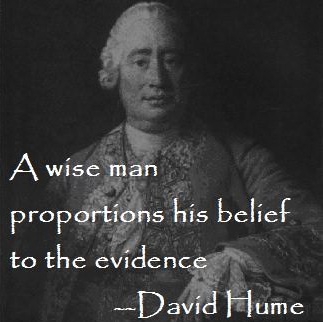Chapter 3. Part B
John Locke (whom many see as the founder of empiricism)
David Hume (arguably the most famous empiricist philosopher)
Very basic ideas lead to more complex
ideas which lead to ways of acting and living. Knowing how ways of thinking and
believing lead to ways of living, and how belief systems can lead us astray, I
now set out to try to construct a reliable base on which I can erect the rest
of my thought system.
In a modern,
scientific view, what scientists yearn to know first is what is real. What is
this ocean of stuff in which we swim our whole lives long, and how do the
things in it work? But the harder we think about this question, the more we see
that there is a deeper one. Again, the most fundamental question is not:
"What is real?" but "How can I know what is real?" That question, stated more plainly, asks:
"What is knowledge?" How
reliable is the system that I use to take in, organize, interpret, and
understand sense data about reality? Trying to answer these questions leads us
into the most basic branch of Philosophy, which is called
"epistemology".
The epistemological
view of most scientists and philosophers today is called
"Empiricism". It is a beginning point. Empiricism assumes that all that
I can know is my sensory experiences and memories of sensory experiences, plus the
concepts that I have been taught, or have discovered, that enable me to recognize
and sort those experiences and memories, plan responses to the events in my
world, and then act out the plans. I keep and use those concepts that have
reliably guided me in the past to more health and vigor and less sickness and
pain as I continue to move through, and respond to, my environment.
Our sense organs
are feeding bits of information into our minds all of the time: textures,
colors, shapes, sounds, aromas, flavors, and so on about the things around us. Even
when I am not consciously paying attention, at other, deeper levels, my mind is
aware of these details. I know, for example, when the noises outside suddenly
contain the sounds of a car approaching or a dog barking. I detect headlight
beams sweeping across my yard, crunching gravel in the driveway, etc. – sometimes
even in my sleep. One spouse wakes up to the baby's crying; the other dozes on.
One wakes when the furnace isn’t cutting out as it should be; the other sleeps.
The ship's engineer sleeps when the steam turbines are roaring and the props
are churning. She wakes when one bearing begins to hum just the tiniest bit
above its normal pitch. She wakes because she knows that something is wrong. Empiricism is the modern way of
understanding this complex information-handling system.
In the Empiricist
view, the human mind notices how certain patterns of details keep re-occurring
in some situations from one time that we encounter them to the next. When we
notice a constant pattern of details in a certain type of situation that we
have met up with on several occasions, then we make mental files, for perhaps
"round things", "red things", "sweet things", or
“crisp things”. Then we save the information about that situation-type in our
memories. The next time we encounter that type of object or situation, we
simply go to our memory files. There, by cross-referencing, we discover:
"Apple. Ah! Probably good to eat." All generalizations are built up
thus.
To be complete here, we must also say that scientists now know most of
the concepts that I use as I recognize things and respond to them are concepts
that I was taught by the mentors and role models that I saw as a child. My
childhood programming teaches me how to cognize things. After that, almost
always, I don't have to cognize things, only recognize them. I only cognize a thing
when it is totally new to me. Why my childhood mentors programmed me in the
ways that they did will be explored in upcoming chapters.
Empiricists claim
that all human knowing and thinking happens in this way. Watch the world.
Notice the patterns that repeat. Store them up in memories. Pull the memories
out and - when they fit - use them to make good probability decisions and to react
effectively in new situations. Remember what works, and keep trying. For
individuals and whole nations, according to the Empiricists, that's life.
There are
arguments against this way of thinking about thinking, arguments against this
model of how human thinking and knowing work, in other words. Empiricism is a
way of seeing our own minds that sounds scientific, modern, and logical, but it
has its problems.


No comments:
Post a Comment
What are your thoughts now? Comment and I will reply. I promise.